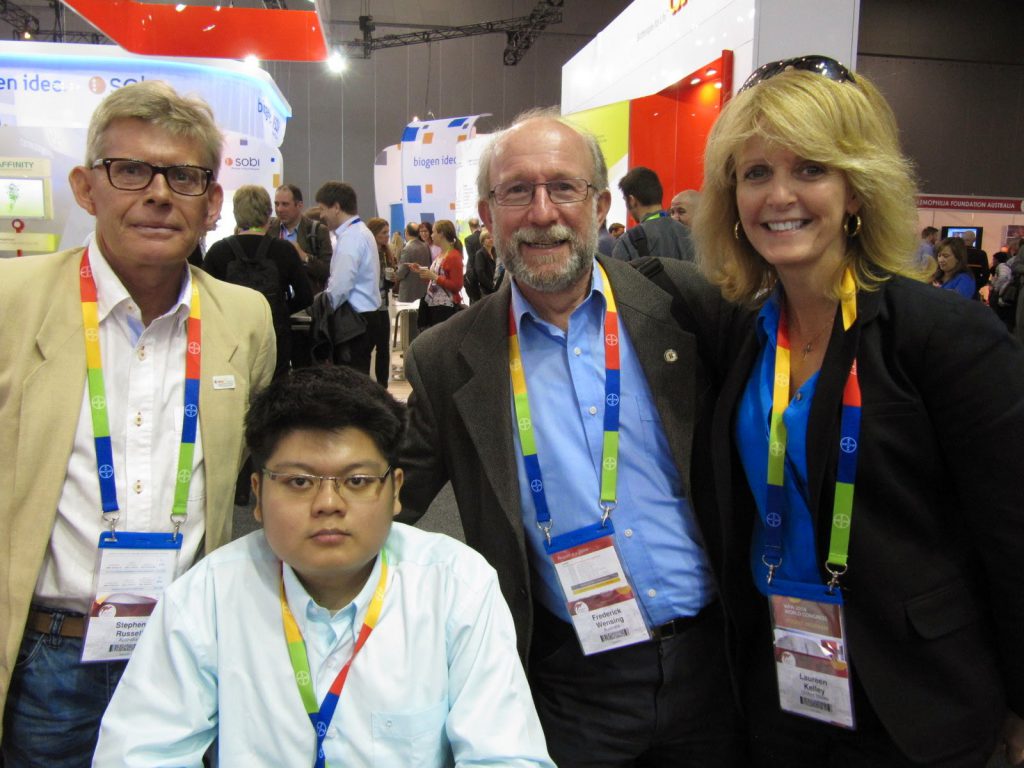 I was in Australia May 8-15, attending the World Federation of Hemophilia Congress. I had the pleasure of meeting a young man named Aung, from the Asian country Myanmar, formerly known as Burma. Aung had written to me months ago requesting sponsorship to the event, plane tickets that cost about $2,000. I am asked frequently for assistance and need to bank my money on people and programs I think will give a return–not to me personally, but to the cause of hemophilia. Myanmar is not a member organization of the WFH and therefore not eligible for funding to the Congresses. Kind of a Catch 22–the countries that need to be there can’t be there unless they have a hemophilia organization. These countries can’t get help forming a society, because they don’t have a society!
I was in Australia May 8-15, attending the World Federation of Hemophilia Congress. I had the pleasure of meeting a young man named Aung, from the Asian country Myanmar, formerly known as Burma. Aung had written to me months ago requesting sponsorship to the event, plane tickets that cost about $2,000. I am asked frequently for assistance and need to bank my money on people and programs I think will give a return–not to me personally, but to the cause of hemophilia. Myanmar is not a member organization of the WFH and therefore not eligible for funding to the Congresses. Kind of a Catch 22–the countries that need to be there can’t be there unless they have a hemophilia organization. These countries can’t get help forming a society, because they don’t have a society!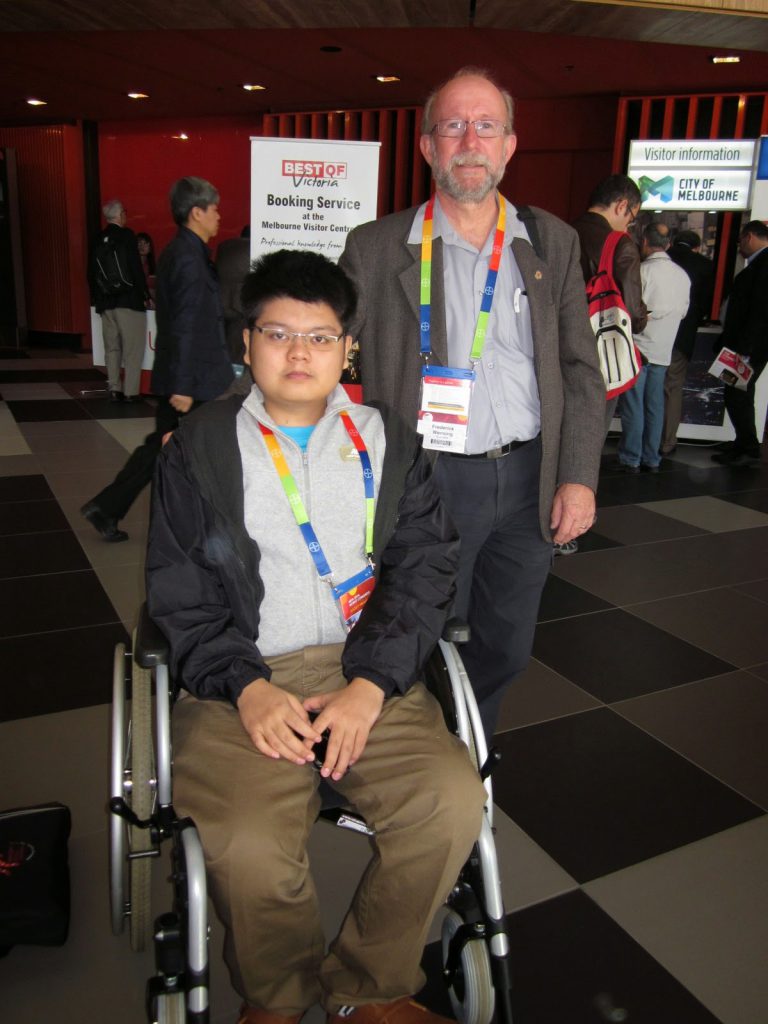
My mother’s worries perhaps foresawthe difficulties ahead. It’s not an easy task for me to deal with the airline
staff who told I am not allowed to travel on the flight because I have no
companion to look after me – because I am disabled. However I had a hard time
with my anger management in my teenage years especially on discriminations
against haemophilia and disability, I showed great demeanor in engaging the
conversation with the staff of the airline. They finally said they would make a
call the captain if he allowed me to be on the plane. It was a huge
disappointment I have ever had on the last minutes before the flight on the
airport. But this time I managed as my best to stay cool and wait for the
response, which was positive.
airport main building, I found Fred Wensing and his wife, Maria. It’d be funny to say
but I had never seen his photo before and had no idea how to find him. Luckily,
he found me instead. The wheelchair at least made it easy for him to spot me in
the crowd.
He and his wife took me to the hotel where I was staying during the Congress days. This is my first trip outside of my country and I have to say everything I perceived in Melbourne is total opposite of what my country has in a positive way. There’s no disabled-friendly sidewalk in Yangon, let alone the other parts of the country. There’s proper treatment for people with haemophilia except blood products which, according to my experience of catching malaria, are really risky. The main difference between Australia and Myanmar is economic conditions, no doubt. But the attitudes of the people here, especially the attitudes on the disability are what I would call really civilized. Whenever I go in Melbourne, I was never welcomed by the quizzical look saying “Why this guy in wheelchair is here?” Attitudes are not about material power or economic prosperity of a country. It’s about
education and nature, I believe. Even if so, there will be a lot of decades
before I will be seen as a person, not as a person in wheelchair.
ran, of course in the motorized wheelchair, to a food shop nearby and had my brunch. The shop sold Indian food and I found for the first time that Myanmar is a cousin of India when it comes to cooking dishes. Their curries greeted my taste buds as old buddies do to each other.
Back in my country, I always had this feeling of being alone before. I found no one who is put into wheelchair by haemophilia and related causes.
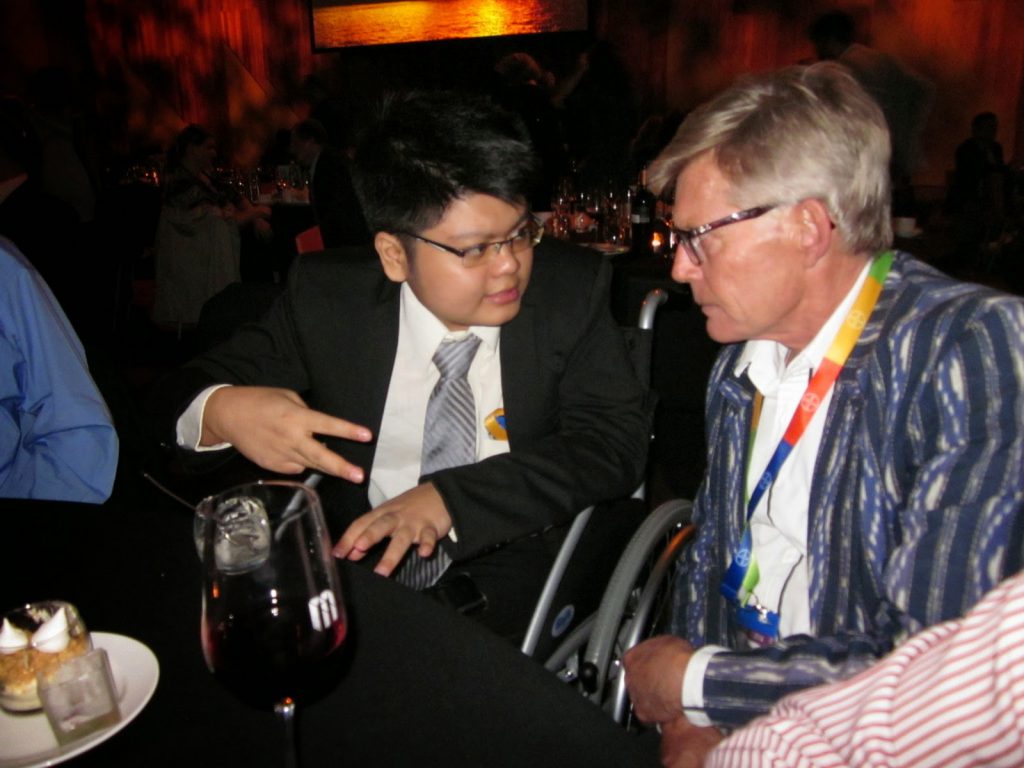 Second day was probably the biggest day of my life and the opening of my adventures. I went to the Congress alone in the middle of the walking crowd who were going to all the directions. I can enjoy the view of the Yarra River along the way to Melbourne Convention Center while enjoying the freedom given by the wheelchair-friendly environment. I went to the session, Management of Hemophilia with Little or No Factor. I had a conversation with one of the speakers, Dr. Daniel Hart from the U.K, on my health problems with blood products. According to him, some form of antibody might have developed in my body due to the prolonged contact with FFP or cryoprecipitate whenever I have bleeding. These antibodies make the treatment with blood products less effective and my immune system is prone to fever and cold when I have blood products as a result. It makes sense of the problems I am facing
Second day was probably the biggest day of my life and the opening of my adventures. I went to the Congress alone in the middle of the walking crowd who were going to all the directions. I can enjoy the view of the Yarra River along the way to Melbourne Convention Center while enjoying the freedom given by the wheelchair-friendly environment. I went to the session, Management of Hemophilia with Little or No Factor. I had a conversation with one of the speakers, Dr. Daniel Hart from the U.K, on my health problems with blood products. According to him, some form of antibody might have developed in my body due to the prolonged contact with FFP or cryoprecipitate whenever I have bleeding. These antibodies make the treatment with blood products less effective and my immune system is prone to fever and cold when I have blood products as a result. It makes sense of the problems I am facingwhen I inject blood products.
operation.
 The doctor also recommended me to see a physiotherapist in the treatment room. I have never thought physiotherapy played a role in giving treatment to people with haemophilia before. The physiotherapist advised me to have some basic exercises in the water. The very important thing, she said, is to do the exercise slowly and to the limit my joints will not bleed. It will be a little bit difficult for me since I have to practice on my own. But I will have to try some of easy exercise. My muscles have suffered atrophy over the period of 7 years I haven’t been able to walk. Hopefully, regular exercise and diet will make the muscles and joints of my legs fit for some movement.
The doctor also recommended me to see a physiotherapist in the treatment room. I have never thought physiotherapy played a role in giving treatment to people with haemophilia before. The physiotherapist advised me to have some basic exercises in the water. The very important thing, she said, is to do the exercise slowly and to the limit my joints will not bleed. It will be a little bit difficult for me since I have to practice on my own. But I will have to try some of easy exercise. My muscles have suffered atrophy over the period of 7 years I haven’t been able to walk. Hopefully, regular exercise and diet will make the muscles and joints of my legs fit for some movement.and we headed to a restaurant for our lunch together. He is 33 years now and he is in wheelchair because of his damaged joints. Inhibitors in his body made it difficult for him to undergo a joint replacement therapy. On the way to the restaurant and at the restaurant, we were engaged in the conversation ranging from relationship and romance to our favorite music. He said he has been going out with a female friend recently but he doesn’t want it to evolve into a relationship. “I don’t want her to babysit me, you know.” I could
give him nothing but an emphatic nod. I know what it feels like to be in wheelchair and to have romance at the same time. Anyone who has been in
wheelchair for seven years will know it too.
him for the next sessions of the Congress after I finished my meal.
was a couple of blocks away from the bar. I was going back to the Center alone and the tense feeling is running along my arms while I was pushing the wheelchair myself. I blamed myself for not noticing the steep ground towards the Convention Center. On the way up, I felt as if my arms were going to explode from the cries of muscles. But I felt the need to prove myself that I am independent and I am capable of going to where I want. Of the things that I have built, self-respect is a real ingredient of my life. I possibly cannot survive all the physical pain from haemophilia and the chronic depression without the sense of self-worth to my own existence and capability shaped by this existence.
back to my destination successfully without the support of the nice people among the pedestrians.
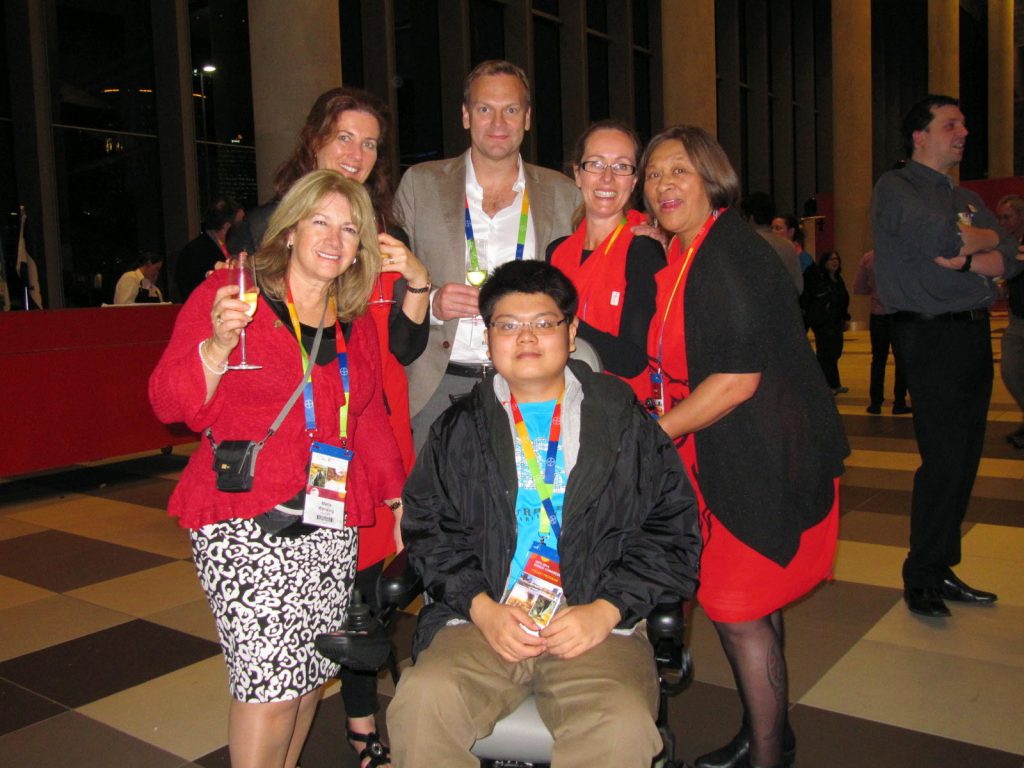 There was one interesting session waiting for me
There was one interesting session waiting for meat the Congress. There were many speakers sharing their experiences such as a
doctor, a community leader and a person with haemophilia under the main topic,
In Our Backyards: Eliminating the Gap in Care Between Developed and Developing
Worlds. As someone who comes from a country with 2 percent of the budget into
healthcare sector, I have concerns for the people with haemophilia in Myanmar.
We have to pay for all the expenses of the treatment and it is extremely
difficult even for the middle-class people like my parents. There will be much
more people in rural area who are not diagnosed with haemophilia and who passed
away because of haemophilia. Personally, I heard the sad stories of the people
with haemophilia who passed away for the inadequate treatment. After I managed
to land the mic calmly in my hands, I raised the question to the speaker on the
difficulty we faced in forming the organization from the start with no data for
haemophilia and related bleeding disorders as well as the hospital with expensive blood products and no factor products. I caught curious eyes from the audiences while I was talking about Myanmar on the mic. In the rest of that day, people came and asked me about the conditions in Myanmar. I cannot bring better treatment, better living conditions and better lives to the people with haemophilia in Myanmar myself alone. But I can spread all the information to the global community and in this way, I might be able to find somebody who is willing to work together with us to find a solution for approximately thousands of people with haemophilia in Myanmar.
people with open heart
news such as the half life of the new concentrate products become longer, which means the treatment will be cheaper with less amount of concentrate used. Maybe prophylaxis treatment will be available to us in the coming decades.
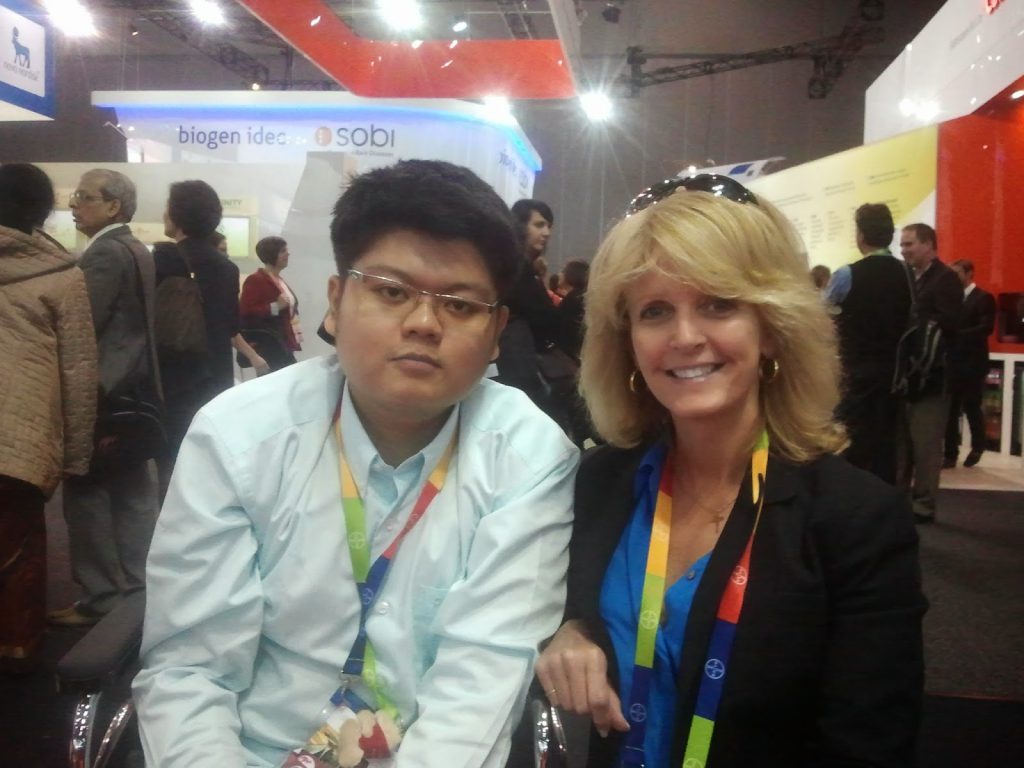
these years. But luckily, as Fred put it, we will not have to wait for 30 years
because science and technology are waiting for us.
I had a meeting with the lady from the US, Laurie Kelley, who sponsored my air tickets. Project SHARE, organized by Laurie and her team, has a positive impact on the haemophilia communities in developing countries. I had talked with her on the possibility of her visit to Myanmar. She said she might visit Yangon during her trip to South East Asia in September. I hope to be able to work with Project SHARE and Save One Life
organized by Laurie for the sake of people with haemophilia in Myanmar in the future.
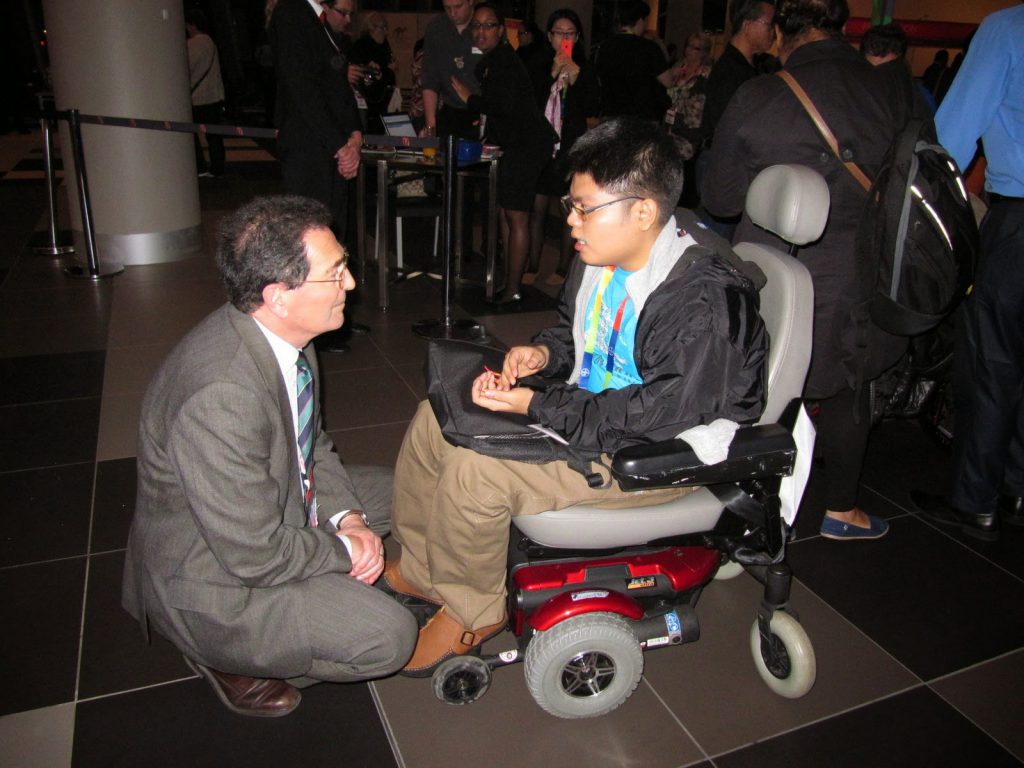
I also had a conversation with the president of WFH, Alain Weill, at the social event, Taste of Australia. He is a good listener. He promised me that he would make sure the people in Myanmar can have the treatment of factor products donated by WFH after the membership application of Myanmar Haemophilia Patient Association is accepted by WFH. My country, Myanmar, has been out of the map of the global haemophilia community
until now. I am probably the first person with haemophilia from Myanmar that has been to a WFH congress. It is very important for all the people with haemophilia in my country to have a representative in the Congress.
the care and treatment of haemophilia as one voice. I will keep in touch and work with these people to form an ASEAN Haemophilia Association in a few years.
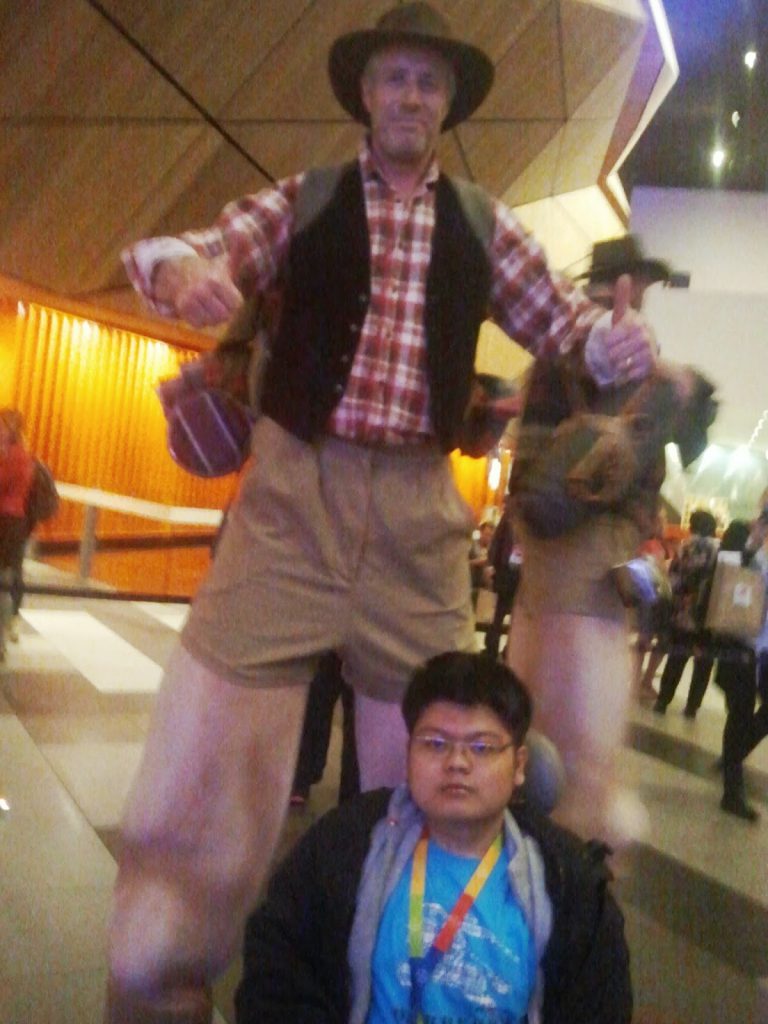 The Farewell Dinner also gave me a perfect condition to make friends with the leaders from haemophilia communities throughout the world. I talked with a president of the Vietnam Haemophilia Association –another contact from ASEAN, young people from Australia and New
The Farewell Dinner also gave me a perfect condition to make friends with the leaders from haemophilia communities throughout the world. I talked with a president of the Vietnam Haemophilia Association –another contact from ASEAN, young people from Australia and NewZealand, and the doctors and nurses specializing in haemophilia.
musicians entertaining the pedestrians. Even the city was dancing along the tunes of the street musicians.
place. Their happiness and motivation diffused to me. Along with other gifts
from Fred, Maria and their son, Damian, Melbourne gave me another gift – courage.
A courage to live with haemophilia and be a community leader for the people with haemophilia in Myanmar is probably the most important gift I have received from the Congress in Melbourne.
Kaung Myat

